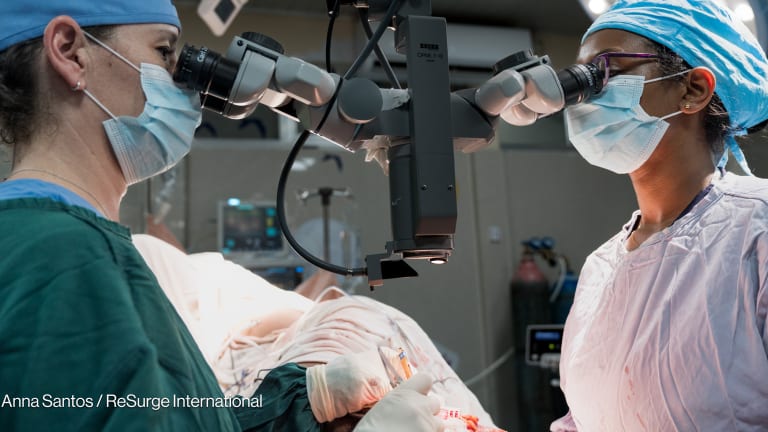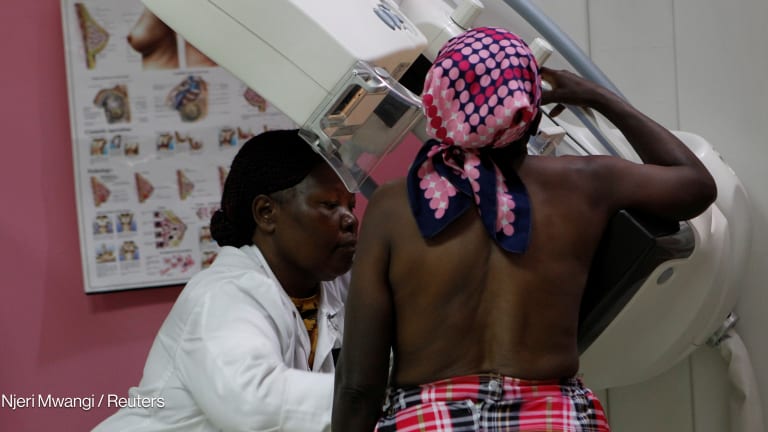
In many parts of the world, advances in medicine mean that a breast cancer diagnosis is not always as life-threatening as it once was. In high-income countries, the survival rate beyond five years is 90%. But limited access to timely diagnosis and treatment means that the survival rate drops to 40% in places such as sub-Saharan Africa. As a result, many women in the region are losing their lives to a disease unnecessarily.
Locally led approaches supported by global donors can help change that, experts stressed during a high-level discussion hosted by Devex in partnership with The Pfizer Foundation on the sidelines of UNGA80.
“The best solutions to health are by the people closest to the challenge,” The Pfizer Foundation’s executive director, Darren Back, said. In 2024, the foundation committed to investing $15 million over three years to expand breast cancer care in Rwanda, Ghana, and Tanzania through grants to Jhpiego and Partners In Health, or PIH.
Building on this commitment and the belief that effective partnerships can be catalysts for change, The Pfizer Foundation convened global health experts in New York City to explore how to reduce breast cancer mortality in sub-Saharan Africa.
Women must be met where they are
Barriers to delayed diagnosis include inaccessible clinics, a lack of transport, or — for women in primary caregiver roles — the inability to prioritize their own health. Debora Bossemeyer, senior vice president of global programs and technical excellence at Jhpiego, explained that this is why breast cancer awareness and screening must be integrated into primary health services, such as antenatal visits and child immunization clinics.
It’s all about simplifying care pathways and designing services around the client, not just the provider, according to Bossemeyer. “I’m a nurse by training, and sometimes we do things convenient for us, but it's not necessarily convenient for the client,” she said.
Nadine Karema, executive director of PIH Rwanda, described how her organization works alongside the Rwanda Ministry of Health to adapt global cancer care frameworks to rural realities. PIH’s 5S approach — ensuring adequate space, systems, supplies, social support, and staffing — addresses not only medical needs but also social determinants such as transport costs that prevent patients from receiving adequate care.
Innovation starts in the community
Local partners working in these communities understand the barriers to breast cancer care best. For that reason, Back said, investing in locally led innovation and forging strong partnerships with governments and community organizations is key.
Community health workers, for example, play a frontline role in early detection, teaching women how to check for lumps, and facilitating timely referrals, Karema explained. They also deliver education that tackles stigma, making clear that breast cancer is treatable and not a woman’s “fault.” Investing in these kinds of support mechanisms helps women “survive and thrive because breast cancer is curable,” Karema added.
Funding the future of breast cancer care
When asked for their advice to funders, the speakers converged on three key themes: collaborate meaningfully and act decisively; center interventions around the patient experience; and align with national priorities rather than creating parallel systems. Their message was optimistic: effective models already exist, but also need purposeful funding to scale.
As an example, in Rwanda, PIH, with support from The Pfizer Foundation, has screened more than 64,000 women and detected over 1,100 cases of breast cancer — demonstrating that early detection and treatment can help save lives when programs are rooted in the local context and strong partnerships.
“Philanthropy plays an important role, and will continue to play an oversized role, particularly in fostering innovation,” Back said, “but we can’t do it alone.”
The session closed with a resounding call to action: breast cancer inequities are solvable when communities, governments, and funders join forces to scale locally designed solutions.

Visit Partnerships with Purpose — a series amplifying innovative and community-led approaches to strengthen and scale global health systems.
This content is sponsored by The Pfizer Foundation as part of our Partnerships with Purpose series. Click here to learn more.








